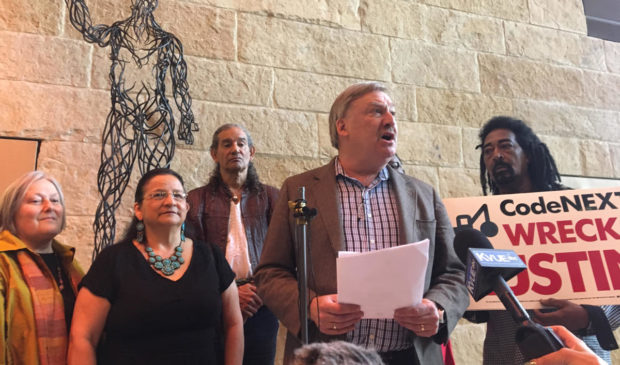Petition to potentially put CodeNEXT on the ballot filed with city clerk
Friday, March 30, 2018 by
Audrey McGlinchy, KUT Activists filed a petition with the city clerk on Thursday in an effort to put all Land Development Code rewrites, including CodeNEXT, to a public vote.
“We believe (residents) should have the right to decide whether this is the new Land Development Code for the city of Austin, or whether we continue under our old code,” said Fred Lewis, an attorney and treasurer of the political action committee Let Us Vote Austin, one of two groups who collected the signatures.
Lewis and other community members, including Mary Ingle, the president of the Austin Neighborhoods Council, and Nelson Linder, president of the local NAACP chapter, hoisted four boxes that they said held more than 32,000 signatures onto a reception desk in the Office of the City Clerk.
“More than I can carry,” Ingle said as she struggled to carry one of the boxes.
To be valid, a petition needs at least 20,000 signatures from registered Austin voters. The city clerk has 30 days to verify the signatures. After that, the petition heads to City Council, which decides whether to put it on the ballot in November or accept the changes the petition lays out.
The petition asks for all comprehensive changes to the Land Development Code, which dictates what can be built and where, to be put to a public vote. If voters agree to that, residents would then be asked to weigh in on CodeNEXT, the city’s effort to overhaul its 30-year-old development code.
It’s unclear whether this petition is legal, however. In February, City Attorney Anne Morgan sent a memo to the mayor and Council members citing outside counsel who said zoning cannot be the subject of a ballot petition in Texas.
“If the intent was to actually come up with an ordinance that was consistent with state law, I don’t know that the people who did this petition have actually presented something that works,” Mayor Steve Adler said Thursday. “But that’s something we need to take a look at.”
“This petition may be inconsistent with (city charter and state) legal standards,” a city spokesperson wrote in a statement.
Lewis is also part of an organization called Community Not Commodity, which is concerned that increased density would negatively affect older neighborhoods with predominantly single-family homes and speed up gentrification. Those who support denser housing in Austin argue prices will drop with more housing and public transit will be improved if more people can live closer to bus lines.
Lewis and the other petitioners maintained Thursday that their petition is not a partisan effort.
“This petition is not pro- or con-CodeNEXT. It is pro-democracy. It is pro-public,” Lewis said, as a member of his PAC stood behind him holding a sign that read “CodeNEXT wrecks Austin.”
This story was produced as part of the Austin Monitor’s reporting partnership with KUT. Photo by Audrey McGlinchy/KUT.
Curious about how we got here? Check out the Austin Monitor’s CodeNEXT Timeline.
The Austin Monitor’s work is made possible by donations from the community. Though our reporting covers donors from time to time, we are careful to keep business and editorial efforts separate while maintaining transparency. A complete list of donors is available here, and our code of ethics is explained here.
You're a community leader
And we’re honored you look to us for serious, in-depth news. You know a strong community needs local and dedicated watchdog reporting. We’re here for you and that won’t change. Now will you take the powerful next step and support our nonprofit news organization?









